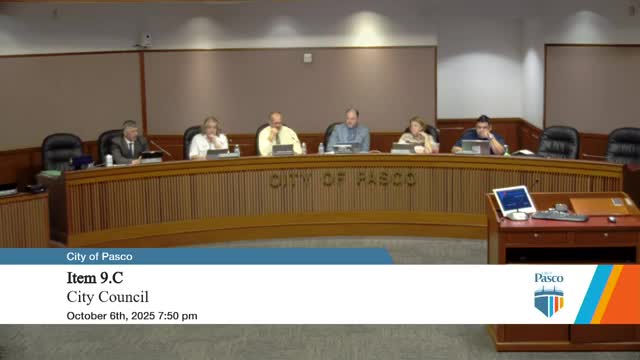Pasco council delays vote on $6.5 million loan to stabilize city health plan
Get AI-powered insights, summaries, and transcripts
Subscribe
Summary
City staff asked the council to authorize a $6.5 million interfund loan from the Economic Development Fund to the self‑funded medical/dental insurance fund to restore required reserves and buy time for premium and plan design changes. Councilmembers asked for more information and directed staff to return at the next regular meeting.
At the Oct. 6 Pasco City Council meeting, staff asked the council to authorize an interfund loan of $6,500,000 from the Economic Development Fund to the city’s self‑funded medical and dental insurance fund to shore up a shortfall and restore state‑required reserves. Council members asked questions and ultimately delayed a final vote so staff could provide additional detail before the council’s next regular meeting.
City Finance staff presented the loan request as a stabilizing measure after the medical plan began running a deficit this year. Director Garcia told the council that “the premiums haven't been adjusted since 2014,” and that the plan’s composite premium structure and rising claims have strained the fund. Garcia said the fund is running at an approximate deficit of about $2.5 million and that state rules require roughly 16 weeks of average claims on hand — about $4.1 million — to maintain a self‑funded plan’s reserve target.
The nut graf: the council’s decision matters because the loan would use city economic development resources to preserve the employee health plan’s status as self‑funded, a move staff says would limit immediate cost increases for the city and employees. If the council does not approve the loan, staff said the city would likely have to switch to a fully insured plan, which staff estimated would raise total city costs by roughly $6.8 million above current budgets and require a multi‑year commitment.
Details of the staff proposal and alternatives Staff proposed a 10‑year interfund loan at 4% interest, with the first payment due next year. Director Garcia told the council the loan would restore required reserves and give time to implement planned corrections: raising premiums for both employer and employee shares, and moving away from the current composite rate structure toward industry norms. Garcia said the Economic Development Fund would receive about $1.4 million in interest income over the 10‑year term if the loan proceeds.
City Manager Harold Stewart described additional causes for the current shortfall and steps staff has taken. Stewart said the city had been operating without two forms of stop‑loss protection: “Typically, self insurance plans will have 3 stop gap insurances in place. Pasco has only had 1 of the 3 in place.” He also cited a national cybersecurity incident that delayed claims reporting and the bankruptcy of a third‑party administrator, both of which pushed claim costs into the current year and magnified the shortfall.
Staff outlined the alternatives: approve the loan and implement premium and plan changes; modify loan terms; or deny the loan and move to a fully insured plan. Garcia warned that closing the self‑funded plan and moving to a private insurer would be costly: she estimated an additional roughly $6.8 million in city costs and 8–10% annual premium increases, and noted that a fully insured arrangement typically requires a three‑year commitment.
Council questions and concerns Council members raised fiscal and timing concerns. Councilman Morales asked how the city had arrived at the deficit and why it had not been raised earlier; Garcia and Stewart explained that a combination of delayed claims, vendor bankruptcy and no premium increases since 2014 created the current situation and that council had been briefed by email and in closed session in recent weeks. Mayor Pro Tem Grama and others pressed whether the loan would reduce the city’s ability to use economic development funds for projects; staff replied the Economic Development Fund has capacity for the loan and that projections do not show immediate impacts to planned projects, though staff cautioned that catastrophic events could require different choices.
Several members sought more time to review details. Councilwoman Blaisdell asked for more briefing with staff and said she preferred to delay action. Councilwoman Ross and others flagged the open‑enrollment schedule as a timing pressure: staff said the renewal numbers arrived only the prior week and that open enrollment for employees is scheduled for November, so a decision is time‑sensitive but still could be moved to the next regular meeting to allow further review.
Outcome and next steps Rather than vote on the loan, the council directed staff to return with additional information at the next regular city council meeting. No formal approval was taken on Oct. 6. Staff told the council it will present clarified numbers, background on reserve calculations and stop‑loss coverage, and updated premium projections when it returns for the vote.
Why this matters to the public The choice will affect city employees’ benefits, the city’s long‑term costs and how the city allocates non‑general‑fund resources. Approving the loan would preserve the self‑funded plan option and spread repayment over 10 years; rejecting it would likely push the city into a fully insured plan with higher near‑term costs for the city and employees. Staff emphasized that without the loan and accompanying plan changes, the city risks failing to meet state requirements for a self‑funded plan.
What staff will provide to council next Staff said it will provide a more detailed breakdown of the deficit, a clearer explanation of reserve and stop‑loss requirements, options for repayment timing and scenarios showing the fiscal impacts of (a) approving the proposed loan, (b) modifying loan terms, and (c) moving to a fully insured plan. The item will return for formal consideration at the next regular council meeting.
